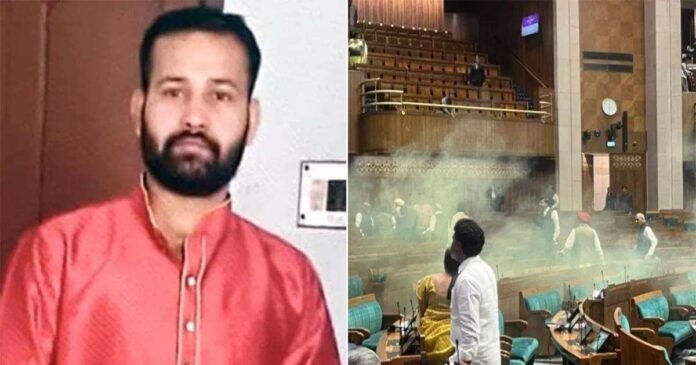In the wake of the recent Parliament security breach, the spotlight turns to the alleged mastermind behind the incident — Lalit Mohan Jha. Surrendering to the Delhi Police after a dramatic escape, Jha’s arrest raises curiosity about the man at the center of this high-profile event. Let’s try to understand more about his life, motivations, and the connection behind the Parliament security breach.
Who is Lalit Jha?
Lalit Mohan Jha, the alleged key conspirator in the recent Parliament security breach, captured the nation’s attention when he surrendered to the Delhi Police on Thursday. His arrest came a day after a shocking incident that led to the apprehension of five others involved in the security breach, leaving the public eager to understand the man behind the headlines.
Jha, who had been on the run since the dramatic smoke scare in the Lok Sabha on Wednesday, walked into the Kartavya Path police station to face the consequences of his alleged role in orchestrating the breach. The Delhi Police’s counter-intelligence team is now diligently interrogating him, aiming to piece together the puzzle of the security breach.
At 32 years old, Jha is believed to be the leader of the intruder group, responsible for devising the plans that unfolded in the heart of India’s parliamentary proceedings. After the incident, Jha took a bold step by sending a video detailing the security breach to a friend in West Bengal, who had connections with an NGO Jha had previously worked with. Additionally, he reportedly destroyed the mobile phones of four other accused, adding an element of intrigue to the unfolding narrative.
Lalit Jha, originally from Bihar, had been working as a teacher in Kolkata, with a sudden departure two years ago that left the community puzzled. Police sources reveal that, like other suspects, Jha drew inspiration from revolutionary figures such as Bhagat Singh and Chandra Shekhar Azad. Their collective union, forged through a Facebook group named ‘Bhagat Singh Fans Club,’ played a pivotal role in executing the security breach, with Jha unofficially leading the group.
Persona of Lalit Jha
The digital footprint of Jha presents a complex persona. Social media posts revealed his criticism of several populist policies of the BJP government. Notably, he promoted the thoughts of freedom fighters Subhas Chandra Bose and Chandra Shekhar Azad, alongside international figures like Fidel Castro and socialist poets like Adam Gondavi. His profile also showcased criticisms of Prime Minister Narendra Modi, the US-led NATO alliance, and satirical remarks about Gandhi and Jawaharlal Nehru’s non-violent methods.
What adds a layer of complexity to Jha’s character is his equal admiration for Swami Vivekananda and philosopher Jiddu Krishnamurti, according to an analysis of his online presence. Jha’s involvement as the general secretary of the unregistered NGO Samyabadi Subhash Sabha, advocating for Netaji’s image on Indian currency notes, reflects his diverse engagements in social causes.
According to Nilaksha Aich, an associate from the NGO, Jha introduced himself as a “social worker who likes to do social work for backward classes.” While no direct political affiliations have been established, social media images surface Jha’s connections with Trinamool Congress leader Rajesh Shukla. Shukla clarified that Jha was “not involved in party politics” and “used to teach kids.”
Jha’s family roots trace back to Dharbanga in Bihar, where his father served as a pandit. After retiring a few years ago, the family left the area, as shared by Shukla. As the investigation unfolds, the enigma of Lalit Jha deepens, leaving a trail of questions about his motivations, inspirations, and connections that led to the Parliament security breach.
